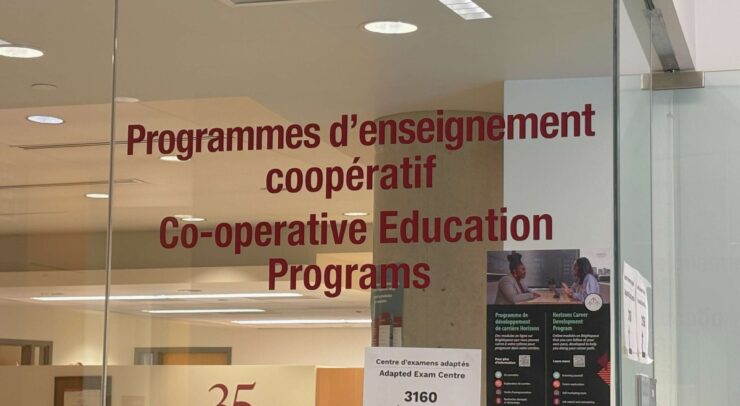The pros and cons of co-operative education
The co-op program, or the co-operative education program as it is less commonly known, is an education stream that can be added to a degree. It gives students the opportunity to gain work experience in a field related to their degree of study. At universities, co-op extends regular four-year university experiences to five years (or by an additional semester), with students working in full-time, paid placements with companies during certain semesters of their study.
The University of Ottawa’s co-op program is presented as one of the best in the country, however, the co-op program is not as seamless as it seems.
Going through a university co-op program can provide relevant work experience, networking opportunities, and chance for career exploration. However, it often comes with a lack of a flexible university schedule, technicalities with fees, and the lack of a guaranteed position at companies applied to.
Medium writer Kevin Lin narrated his experience as an engineering student with his university co-op at the University of British Columbia. He stated that while there were obvious benefits: obtaining practical, industry experience and getting money that could help pay for housing and tuition, there were also hidden downsides to the program.
“Firstly, you have to pay for co-op. It’s obvious in hindsight,” Lin wrote. “Still, this fee wasn’t mentioned in the information sessions and co-op was presented as a no-brainer with no downsides.”
Finding a job also proved to be more taxing than he expected. Lin recalled, “Between creating resumes, writing cover letters and filling out job applications, the job search was pretty much another course’s worth of homework.”
Nevertheless, for him, the program was a net benefit: earning him income which enabled him to start investing, boosting his confidence in his ability to land a job after graduation, and giving him productive time out of school.
Similar to UBC, the University of Ottawa has several pros and cons to co-op, with students having varying opinions on whether they find the program worth it or not. At the University of Ottawa, the co-op program is available in 68 undergraduate programs and 14 masters programs. It has been in existence for nearly 40 years and is one of the top five co-op programs in Canada. It admits roughly 1,000 domestic and international students annually, with allowance for placements abroad.
“There are approximately 4,000 students participating in the co-op program each year.” said Jesse Robichaud, the university’s spokesperson in an interview. “Students consistently highlight the value of gaining real-world experience, building professional networks, and enhancing their career readiness through paid work-terms.”
Comparable to the experience of Kevin Lin, co-op at the U of O is often marketed as an experience with few downsides or financial commitments. Unfortunately, this is not always the case. At the U of O, most co-op programs are optional. However, students with mandatory co-op programs must pay either $641 or $806 per co-op term, depending on their citizenship status.
“Co-op is an optional program (except for software engineering and master’s experiential psychology), and students can choose to withdraw if they determine it’s not the right fit for them,” stated Robichaud. “While we track student participation through program statistics, we focus on providing the right support to help students succeed in co-op.”
The extensive nature and diversity of U of O’s co-op program often means that in some disciplines, the program is over-crowded with limited appealing job choices.
“There are not enough placements and I think it may come down to the funding the English department is given.” Elise Maccaull, a third-year English major at U of O, commented, making a possible connection between the small size of the English department and the number of co-op placements they receive. “There are some good placements with the government and publications, but they are so few. English is not really a co-op program in my mind.”
If students are unable to find an appealing placement, they may end up with less suitable options, like administrative work at the university.
Vice-president international for the Development Students’ Association (AEDSA), Tom Chazelle Schulze, recalled his conversations with students about co-op. He noted that in the past, students had been placed with the Lost and Found Centre or residence life — in one instance, a student had to do an unpaid placement.
Some other students are unable to find jobs at all.
This is more common with international students in academic programs whose worthwhile co-op placements are mostly government jobs. With government co-ops, preference is given to Canadian citizens and bilingual applicants. As such, despite paying a higher amount to be in the co-op program, international students (especially in programs with government co-ops) are not given priority by employers and are often left stranded in the co-op stream.
“Our program has a lot of international students who are in co-op and they face several barriers, including obtaining security clearance and having a diversity of co-op job offers [outside government jobs].” president of the Conflict and Human Rights Association (CHRA) Gabrielle Plastiras remarked, “Most of the job availability for our program are government jobs and that leaves international students stranded. Sometimes the co-op office lets them know they don’t have placements for them.”
Co-op may also affect the way grades are calculated when applying to professional programs like medicine in some universities. As such, the decision to enroll in a co-op program should be considered while being fully aware of what steps need to be taken when applying for professional programs in the future.
“We encourage students to attend drop-in sessions and to watch informational webinars before accepting their co-op admission offer,” remarked Robichaud. “The Welcome to Co-op webinar provides a detailed overview of the program, followed by a Q&A session where students can ask about specific considerations. Our team is always available to help students make informed decisions based on their individual circumstances.”
While some of these flaws can be managed with the right amount of preparation, most of these cons are not discovered until you get into the co-op program and have, oftentimes, paid the first fee. Afterall, students are not able to ask questions about issues they are unaware of.
Regardless, it isn’t always a dire story. The U of O co-op program has a dropout rate of between 8-10 per cent with students leaving the program for personal reasons or to focus on their studies. Overall, the U of O co-op program is renowned for enabling students to get access to public service jobs, gain relevant work experience and build professional networks before graduating from school.
“The system is not perfect. Sometimes, it feels like a gamble because you have to decide whether to take a decent job offer or wait on the decision from your preferred job,” said AEDSA president Juliette Houle Charbonneau, who is currently on a co-op work term.
Charbonneau, like many other students, had to face the effects of a policy change by the co-op office for the 2025 winter term. Instead of multiple rounds of interviews, co-op students have two business days to accept or deny a job offer. This change has led to students having less time to wait on multiple job offers to arrive, and often have to choose between accepting their first offer, or risk the possibility of not getting another offer if they wait on another offer and the first offer expires.
In Charbonneau’s experience, development students get placements in the federal government and may also get certain kinds of security clearances that may be valid after graduation. Those clearances are helpful when students are applying for full-time positions at the federal government.
Currently, the co-op office is working to improve its services through student surveys, and revamping workshops to offer students better support in their co-op journey. The office is also working towards developing a new co-op portal with the help of the direct input from students as well as adapting the placement process to align with the evolving job market needs.
Students interested in co-op are welcome to attend the weekly drop-in sessions.
The benefits of co-op are not overstated, however, students need to be fully informed about the challenges that accompany participating in the program.






